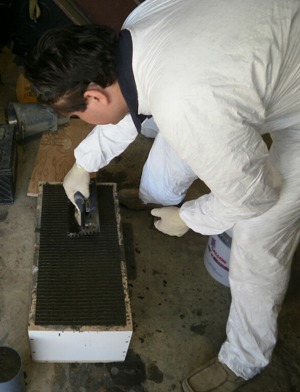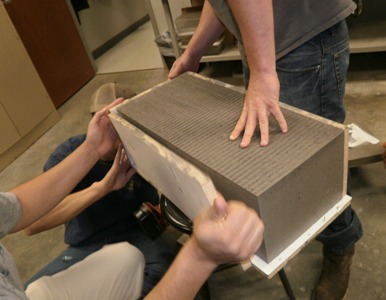NEWS
‘Green’ concrete developed at Louisiana Tech on display at Detroit Science Center
Geopolymer concrete, an innovative and environmentally-friendly building material being researched at Louisiana Tech University’s Trenchless Technology Center (TTC), will be featured in a transportation exhibition taking place at the Detroit Science Center.
Developed by Dr. Erez Allouche, research director for the TTC, and his team, geopolymer concrete is an emerging class of cementitious materials that utilize “fly ash”, one of the most abundant industrial by-products, as a substitute for Portland cement, the most widely produced man-made material on earth.
“Presenting geopolymer concrete at a widely-attended public exhibition provides essential exposure to this emerging green construction technology,” said Allouche. “If the public is aware that there are more sustainable ways to construct our highways and bridges, it will expect its government agencies to explore and promote these ‘greener’ technologies.”
“This sort of political pressure is essential for new materials, such as geopolymer concretes, to overcome the multitude of bureaucratic barriers that exist between the laboratory and the construction site.”
In comparison to ordinary Portland cement, geopolymer concrete features greater corrosion resistance, substantially higher fire resistance (up to 2400° F), high compressive and tensile strengths, a rapid strength gain, and lower shrinkage.
The fly ash used in the specimen for the Detroit Science Center exhibit was obtained from Cleco Power’s Dolet Hills coal-fired power station near Mansfield, Louisiana. Mr. Ivan Diaz-Loya oversaw the preparation of the mix design and cast with the assistance of TTC technicians Chris Morgan and Ben Curry.
“Geopolymer concrete technology is here to stay,” Allouche said. “We expect to see a growing number of commercial applications of this green and innovative technology across the construction industry, with applications in the area of transportation infrastructure leading the way.”
Allouche says the Alternative Cementitious Material research group at the TTC is one of the top groups in the country in this field and will be a key player in the development and commercialization of geopolymer concrete technology for years to come.
Geopolymer concrete’s greatest appeal may be its life cycle greenhouse gas reduction potential – as much as 90% when compared with ordinary Portland cement. Researchers at the TTC continue to work on ways to replace Portland cement with cementitious binders made from industrial waste. Some next generation geopolymer concrete could last several times longer than ordinary concrete.
Louisiana Tech’s Trenchless Technology Center promotes research, development and technology transfer in the trenchless technology industry, and educates engineers, contractors, and government agencies about the availability and capability of trenchless methods for the solution of complex underground infrastructure problems.


Recent Comments